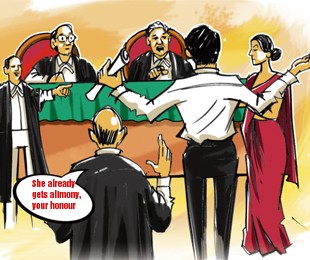Take:
1. Soon she'll find a third HUSBAND (victim) and the then ld. HC Jjudge will say "So what if TWO previous husbands are paying her alimony. You pay too!" - and soon both the judge and the metro wife will become rich at Indian bakaras cost..........
2. Even some dd. Judges needs to go back to Law school to comment such perverse remarks to second husband in open Court when she is already getting Alimony (i.e. per month) from first husband and yet HC is giving her second alimony (be it one time or per month whatever the outcome be on 21-10-2011) which is bad in eyes of Law for first husband as Law on Alimony clearly says "till she gets re-married" now frm present estranged Spouse who is going to tell the first husband to stop paying alimony or will ld. Jstc Patil call first Husband and ask him to stop paying alimony as she is going to get now from her second husband...the answer is in Jstc Patil's remarks itself i.e. NO..
One alimony no bar to a woman getting another
Husband’s counsel tells court that estranged wife is already getting alimony from another ex-husband. Judge retorts: “What is your problem if he is paying? You too will have to pay”

A man tried to evade paying alimony to his estranged wife by pointing out that she was already getting an allowance from another previous husband. But the judge retorted, “What is your problem if he is paying? You too will have to pay.”The rather unusual situation cropped up in the High Court of Karnataka on Monday, with the man’s counsel arguing, “She is being paid Rs 6,000 per month as alimony by a former husband as well.” Taken by surprise, the division bench of Justice N K Patil and Justice C R Kumaraswamy asked the counsel which husband he was talking about. The advocate explained that the woman had been married earlier and the case in question was related to her second marriage.
It led to Justice Patil retorting, “What is your problem if he is paying? You too will have to pay.”
The divorce case, which was being heard in a lower court, reached the high court, with concerned parties disputing the alimony amount.
When told that the first husband was paying the woman Rs 6,000 per month, the judge asked, “Does she have a child?” When told that she had a seven-year-old daughter, he asked, “How much of the Rs 6,000 is for the mother and how much is for the child?” He was told that the amount was for both of them.
PROPERTY IS A LIABILITY
The husband’s counsel told the court that his client had agreed to pay a one-time lumpsum amount to his estranged wife. “So, solve the problem. Let the parties talk and come to a mutual agreement. If they do not come to an agreement, you can argue the case on merits. He will have to then pay 50 per cent of his property to her if arguments are done,” the court said.
This prompted the husband’s counsel to tell the court that he had no property. “I do not have anything. I have no property,” the husband’s counsel said.
The court said that these were human problems and there should be trust in the marriage.
The husband’s counsel said, “If she goes about filing criminal complaints on charges of dowry and domestic violence, there is no trust left. No marriage is a benefit. It is always a problem. Acquiring property is a liability in marriages now.”
Justice Patil put an end to the argument saying, “Every couple quarrels, but not all end up in court and jail… Loud arguments will not help anyone in personal problems. The question here is only about maintenance. Is there any problem with the first husband?”
When told there was none, the court asked the couple to meet, along with their counsels, and arrive at a mutually-agreed alimony amount by October 21.
WHAT THE LAW SAYS
Advocate Nagendra Naik says that the wife’s income will decide the alimony. “When calculating the maintenance, the income earned comes into play. Whether the wife is earning is important, but it does not matter if it is as alimony from a previous husband, salary from a job or profit from business. The thumb rule is that the husband has to pay as much to maintain the lifestyle that he himself is enjoying. The idea of alimony is not to punish anyone or make a profit out of the divorce. The judge will balance all these things,” Naik said. However, there is no definite statute that calls for a lumpsum payment. “Maintenance is allowed under Section 125 of the Criminal Procedure Code and Section 18 of the Hindu Adoption and Maintenance Act. Since there is no rule for a one-time payment, it has to come from the general consensus of both parties,” Naik said.
Link:
















